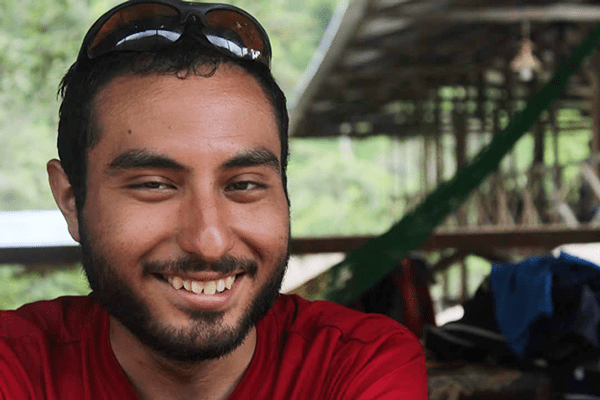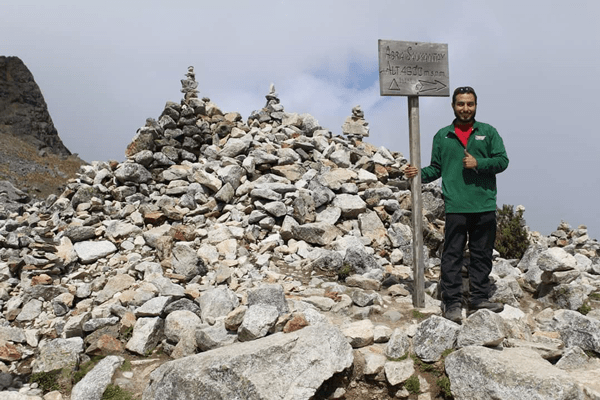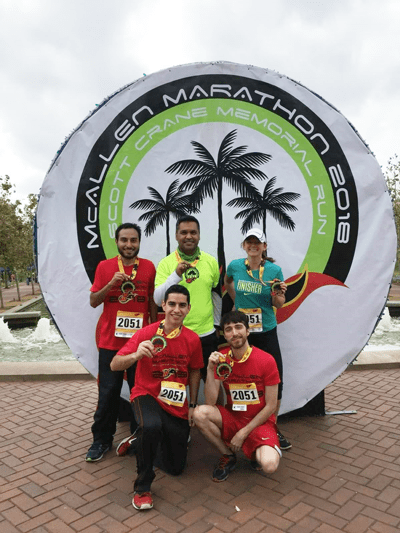Alex Marroquin: Taking the Teach Abroad Leap to Germany
 Throughout Alex Marroquin’s career, he’s had plenty of opportunities to become an engineer or programmer — but he kept finding his joy and calling in teaching. Now after being a high school math teacher in Texas for the past five years, he is taking the exciting leap into international education. Follow Alex’s journey, advice, and more in his thoughtful story below:
Throughout Alex Marroquin’s career, he’s had plenty of opportunities to become an engineer or programmer — but he kept finding his joy and calling in teaching. Now after being a high school math teacher in Texas for the past five years, he is taking the exciting leap into international education. Follow Alex’s journey, advice, and more in his thoughtful story below:
Currently, I am a high school mathematics teacher at PSJA Southwest High School, a public school in the Rio Grande Valley, a few miles from the U.S – Mexico border. For 5 years, I have worked there teaching most grade levels and many kinds of students: from struggling students in remedial Algebra to motivated ones in pre-AP Algebra 2. Recently I finished my masters in Computer Science. Despite having plenty of opportunities to work as an engineer or programmer, teaching has become a passion of mine which I intend on pursuing for a long time.
When I was little, my parents suggested for me to become a teacher since I would get many vacations and could get jobs teaching around the world more easily. As I grew older I forgot about it to focus on my interest in engineering. I intended on going straight to a PhD program or work at the research division of an engineering company. However, I found myself enjoying teaching others at summer camps and the university tutoring center. These experiences along with personal circumstances slowly convinced me to go into teaching.
As it turned out, the district has a dual language program through which they bring teachers from Spain to offer certain classes in Spanish for a few years. In particular, almost half of the math department was under the program so I got exposed to a different perspective on teaching early in my career. Some of them had made it a lifestyle to teach at a new country for a few years then head out somewhere else to teach and explore. These interactions started planting the idea to move abroad, even if temporarily. Teaching abroad became even more appealing after taking my first trip overseas. Although I bumped into many gap year and college students, I kept meeting teachers working abroad. They were professionals building a career and travelling while doing so. Many of them suggested for me to apply to international schools since it would be higher salaries than most TEFL instructors while working at a proper school and building a career. Such interactions throughout my travels and at work hooked my interest to work abroad until I finally took the jump this year and applied.

Congratulations on your new position at the John F. Kennedy School in Berlin! What excites you most about your new role? How did you know when you found the right fit?
Even though I’ve travelled a lot, I’ve only been to Europe once before, and not to the western countries. Working as a teacher there would give me the chance to explore the continent. Furthermore, it would also be a good base for travelling elsewhere. My biggest costs in travel has been airplane tickets. It’s expensive to fly overseas so having a base close to so many destinations would let me travel more often and for cheaper. Travelling would be easier since everything is a short plane ride or road trip away.
Deciding which school to go to was a tough choice. In China, I would save a lot of money but there would be a strong language and cultural barrier. In Germany, I would not save as much, but it’s more similar culturally than China so assimilating would not be as problematic. The biggest factor which convinced me to accept with JFK is that it is a public state school. I’ve been curious as to how public schools in other countries differ from the U.S. JFK has an integrated bilingual program that includes both U.S. and German curriculum. Students have a chance of graduating with an American diploma or German Abitur. This would enable me to observe how a different education system functions, unlike many other international schools that solely focus on an AP/IB curriculum. I would also avoid being in an expat bubble since approximately half of the staff are locals unlike most other international schools. That way I can better learn the language and local customs.
What inspired you to sign up with a service like ISS, and how has your experience been?
I found out about ISS after researching the schools I wanted to apply to. Several of them had links to ISS for their applications which made me curious about what it was. Although at first I was a bit wary, after several days of looking around on the internet I took the plunge and signed up. It was rather straightforward and simple to sign up. Just pay the registration fee, fill out your personal info, request 3 recommendations from your supervisors and that’s it. I actually spent more time updating my resume than signing up. What surprised me was the sheer amount of schools on the system. I wasn’t even aware so many international schools existed. Originally I planned on only applying to schools in Japan but I decided to keep myself open to opportunities elsewhere after seeing all the possibilities. Since I signed up early in the school year there weren’t as many positions available. However, I took this as an opportunity to better prepare myself.
Around October, I joined an iFair® to check out how the schools are and have more one to one interaction with the recruiters. From the iFair® I managed to set up interviews with two schools in China while applying to various other locations. Early November I got a response from John F. Kennedy School Berlin for a mathematics teacher position. It had been one of those applications which I submitted but wasn’t expecting to get a response since I heard getting positions in Europe is hard. After submitting additional materials and an interview later I got the offer and accepted. I couldn’t believe how fast and simple the process was. In Texas, teacher applications usually don’t open until April or May and at earliest and get responses by mid to late summer. Yet I already had a position for the next school year by November. Not even in my dreams did I think it would be so easy to find a job overseas. If I hadn’t signed up for ISS I wouldn’t be looking forward to moving to Germany this summer.
 What research did you do before accepting your job?
What research did you do before accepting your job?
I began by asking my co-workers, since many of them come from Spain, as to how they had to prepare in order to make their move overseas. From them I learned what items to bring and which to buy, which documents were required, and how to settle in. One of the most difficult parts for them was finding housing and transportation in addition to setting up bank accounts. They had to rely on previous members of the program or do it themselves since the district didn’t help out much. I asked about that and about professional development, certification renewal, and basic necessities during the interview so I would be confident about what I needed if I decided to move over there. Fortunately, JFK helps out with locating housing and setting up a bank account while public transportation in Berlin is good so most of my worries were gone. Most international schools schools help out with such necessities and some even pay for a good portion of living expenses. I also researched how the schools were before applying to them. This gave me an idea of what to expect and what particulars to ask about in the interviews. Once I got the offer from Berlin I asked my co-workers again what they thought about the offer. All of them pretty much said I was being offered a better package than when they taught back in Europe. This in addition to being a public school convinced me to accept the offer.
What advice would you give to educators looking to recruit overseas for the first time?
Give it a shot and don’t limit yourself. Most teachers believe teaching English is the only opportunity to work abroad when it isn’t. You can build a career in teaching while exploring the world. There’s plenty of opportunities to teach abroad most of which are not TEFL related. Math, science, and technology teachers are always in high demand in any country. Even other contents are not too hard to find positions for. Not enough teachers apply to teach overseas which causes many positions to go unfilled. Make sure to apply early but don’t jump on the first opportunity available either. Take your time, interview for various positions, and research not just the school but also the location. International teaching is more than just a job. It’s going to be your life for at least 2 years, if not more, so make sure not just the school but the location fits with you. Find out about the benefits, potential savings, and local lifestyles. Even if you don’t get to save as much money the school might make up for it in other ways such as professional development or ease of living. Most of all, be open to the opportunities out there. It’s scary taking the first step, but once you do, you won’t regret it.
Thank you for sharing your journey and advice, Alex! You have an amazing story leading you to international education, and we’re so excited for you to make the leap abroad. Can’t wait to hear all you will teach (and learn) in Germany!







